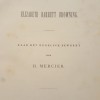
Karen Dieleman, “Aurora Leigh in the Netherlands, 1870-1900″
Elizabeth Barrett Browning’s 1857 verse-novel Aurora Leigh entered the cultural and social-political life of the Netherlands in the 1870s and 1880s through the work of three Dutch people: a literary critic, a social reformer, and a novelist. Conrad Busken Huet, the country’s leading literary and cultural critic, first brought the poem to Dutch attention in 1873 by showcasing it as a model of great art with high social and moral purpose, from which Dutch contemporary poetry could learn. Hélène Mercier, one of the leading social reformers of the country, then translated the poem into Dutch in 1883 to inspire the country’s social reform efforts. Its prophetic voice, Mercier declared, spoke as directly to the social conditions of the Netherlands in the 1880s as it had to those of England in the 1850s. Arguing that it was not necessary to retain Aurora Leigh’s poetic form for this voice to have effect, she translated the poem as prose. But Dutch novelist Martina van Walcheren did not agree. She produced a poetic translation in 1885 that her publisher supported at least in part because he opposed the emerging art-for-art’s sake movement. All these literary, social reformist, and aesthetic developments or debates were also fueled or complicated by national and international book economies and copyright questions.
